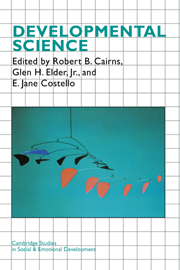10 results
Head and Neck Cancer: United Kingdom National Multidisciplinary Guidelines, Sixth Edition
-
- Journal:
- The Journal of Laryngology & Otology / Volume 138 / Issue S1 / April 2024
- Published online by Cambridge University Press:
- 14 March 2024, pp. S1-S224
- Print publication:
- April 2024
-
- Article
-
- You have access
- Open access
- HTML
- Export citation
2 - From Birth in a British Orphanage to Assessments of American Indians’ Development
-
-
- Book:
- The Science of Violent Behavior Development and Prevention
- Published online:
- 28 January 2021
- Print publication:
- 18 February 2021, pp 26-45
-
- Chapter
- Export citation
Acknowledgments
-
- Book:
- Developmental Science
- Published online:
- 09 November 2009
- Print publication:
- 28 August 1996, pp xix-xx
-
- Chapter
- Export citation

Developmental Science
-
- Published online:
- 09 November 2009
- Print publication:
- 28 August 1996
Contents
-
- Book:
- Developmental Science
- Published online:
- 09 November 2009
- Print publication:
- 28 August 1996, pp v-vi
-
- Chapter
- Export citation
Subject Index
-
- Book:
- Developmental Science
- Published online:
- 09 November 2009
- Print publication:
- 28 August 1996, pp 287-291
-
- Chapter
- Export citation
Frontmatter
-
- Book:
- Developmental Science
- Published online:
- 09 November 2009
- Print publication:
- 28 August 1996, pp i-iv
-
- Chapter
- Export citation
Author Index
-
- Book:
- Developmental Science
- Published online:
- 09 November 2009
- Print publication:
- 28 August 1996, pp 279-286
-
- Chapter
- Export citation
References
-
- Book:
- Developmental Science
- Published online:
- 09 November 2009
- Print publication:
- 28 August 1996, pp 235-278
-
- Chapter
- Export citation
List of Contributors
-
- Book:
- Developmental Science
- Published online:
- 09 November 2009
- Print publication:
- 28 August 1996, pp vii-viii
-
- Chapter
- Export citation

